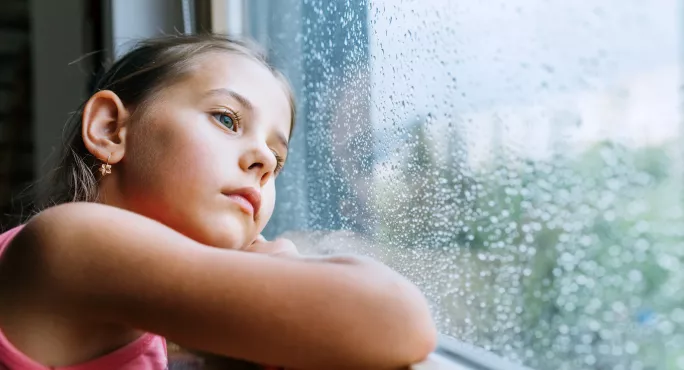- Home
- How to talk to children about cancer
How to talk to children about cancer

Very often, when we talk to children about difficult subjects, we use euphemisms so as not to scare them. But this can lead to confusion.
This is particularly striking when it comes to talking about cancer. A common trap in an effort to make things less scary is to talk in hushed tones and refer to cancer as something like “the big C”, avoiding the actual word “cancer”.
To many adults, the word cancer is frightening; it has negative connotations. This is hardly surprising when a generation ago, a diagnosis of cancer signified the end of life in many cases. But things have changed. Today, one in two of us will get cancer, and around 50 per cent of us will live at least ten years after being diagnosed.
To soften the blow, parents may refer to their cancer as “being poorly”. But children take things literally. For a child, “being poorly” means three days off school and Calpol.
I once had an adult tell me that, owing to misleading information given to them as a child, they thought their mum had died as a result of a broken arm. Many years later, that person found out that her mum had actually died of melanoma (skin cancer). Similarly, it’s not uncommon to refer to bowel cancer as a “sore tummy”. But, for a child, when mummy or daddy lose their hair and is nauseous because of their “sore tummy”, imagine the fear when they next have a sore tummy. It’s likely they will worry that they will be sick or their hair will fall out.
If we talk to children about cancer in the right way, offering realistic and honest support, we can take the shock away and make their experiences less traumatic, even though we can’t make them less sad.
When a child experiences a bereavement from cancer (or other circumstances), a common response is to say “I’m sorry for your loss”. Again this is confusing. Is this person lost? Have they been left by mistake at the motorway services? The same applies to the phrase “pass on”. Pass on where? And what about something like “Mummy or daddy is in the stars, shining brightly over you”? I once saw a child who was told mummy was a shining star in the sky. A couple of years later, she was struggling to sleep and was having nightmares. It turns out that on cloudy nights, she couldn’t see the stars and therefore she couldn’t see her mummy.
So how can we help children in schools? I’ve had children say to me that they didn’t think the teacher knew their parent had cancer or had died. I’m pretty sure they did! But because staff didn’t know what to say, they said nothing. Yet saying something, even if a bit clumsy, is always better than saying nothing. It allows the child to know that you know - and that you care.
It’s important for children to see that you support them. But choose your words carefully. For example, if you say “I’m here for you”, is that a promise you can keep? Will you be there for them at 2am on a Saturday morning when they are upset? Equally, you might say “everything will be OK”, but how do you know this? You need to find phrases that work for you and avoid well-meaning cliches. Having appropriate literature available might be helpful here.
However, many of us struggle to use the words “die” or “death”. If a child has been bereaved, it’s OK to say, “I’m really sorry to hear what’s happened”. In this way, you’ve introduced the topic of conversation, but are not hiding behind it. You are allowing the conversation to open up if the child wants to move it forward.
If a pupil is affected by cancer, it’s important to liaise with the family and other staff members to find an agreed approach and appropriate language to use. Meet the family as early as possible, so you can agree on a strategy. Experience has shown me that once the word “cancer” is no longer a secret, the parents’ stress levels reduce. But of course, some families will not want this honest communication. We must respect that, too.
And remember that people who work in schools are human. We all need to offload in a safe place, and it’s OK to cry. Supporting your colleagues when there is a cancer diagnosis in the school environment is vital.
Today, a quarter of us who are diagnosed with cancer are parents of school-aged children. It is time to be more honest in our discussions about cancer. If not for us, then for our children - whether it’s those we parent, or those we teach.
Julie Cole, family support service lead at the Fountain Centre Royal Surrey County Hospital
Keep reading for just £1 per month
You've reached your limit of free articles this month. Subscribe for £1 per month for three months and get:
- Unlimited access to all Tes magazine content
- Exclusive subscriber-only stories
- Award-winning email newsletters